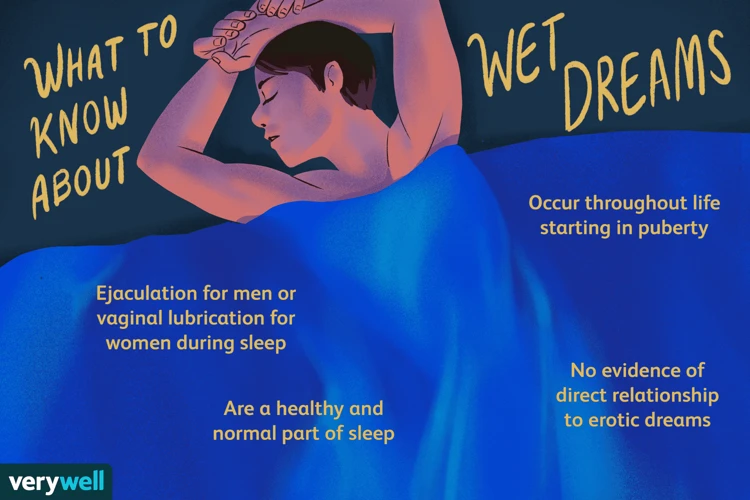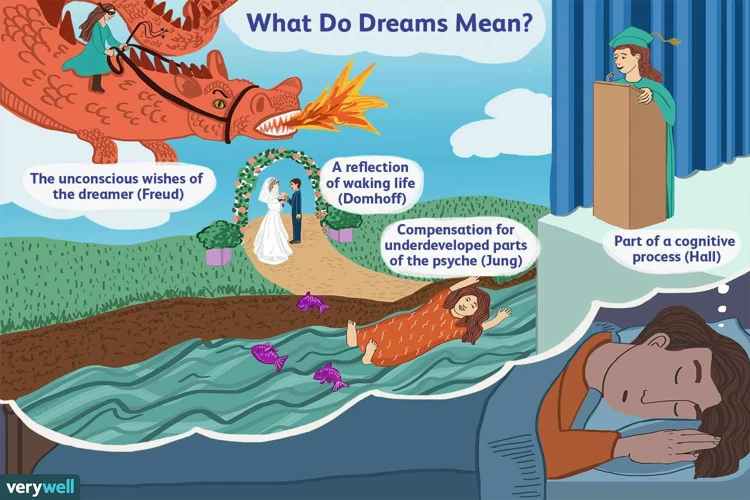Understanding the Meaning of Wet Dreams: Exploring Symbolism and Interpretation

Have you ever woken up from a vivid dream, only to discover that you were not just dreaming, but experiencing a wet sensation down below? These enigmatic nocturnal experiences, commonly known as wet dreams, have puzzled and intrigued people for centuries. In this article, we delve deep into the meaning behind wet dreams, exploring their symbolism and interpretation. From innocence and sexual desires to exploration of inner thoughts and emotions, wet dreams carry layers of significance that go beyond a mere physiological response. We will take a closer look at how wet dreams are perceived from different psychological perspectives, cultural and religious interpretations, as well as how personal context and experiences influence their meaning. We will also debunk common myths and misconceptions surrounding wet dreams, shedding light on their psychological effects, impact on relationships and communication, and whether they can be seen as signs of sexual dysfunction. Join us as we unravel the mysteries behind wet dreams and gain a deeper understanding of these intriguing nocturnal phenomena.
What are Wet Dreams?

Definition:
Wet dreams, also known as nocturnal emissions, refer to the occurrence of involuntary ejaculation or vaginal lubrication during sleep. These dreams often contain sexually arousing content and typically happen during periods of rapid eye movement (REM) sleep. While wet dreams are commonly associated with adolescence and puberty, they can occur at any age and are a natural physiological response to the body’s sexual development and hormonal changes.
Frequency:
The frequency of wet dreams can vary greatly from person to person. During puberty, when hormonal fluctuations are at their highest, wet dreams may occur more frequently. However, as individuals grow older, the occurrence of wet dreams tends to decrease. Factors such as sexual activity, abstinence, and overall hormonal balance can also influence the frequency of wet dreams. It’s important to note that wet dreams are a normal and healthy part of sexual development and do not indicate any underlying medical condition or problem.
Definition
Wet dreams, also referred to as nocturnal emissions, entail an involuntary ejaculation or vaginal lubrication that occurs during sleep. These dreams usually contain sexually stimulating content and are commonly experienced during REM (rapid eye movement) sleep. Wet dreams are frequently associated with adolescence and puberty, although they can occur at any age. They are a natural biological response to the body’s sexual development and hormonal changes. To learn more about the meaning and interpretation of wet dreams, you can refer to our article on “What is the Meaning of a Wet Dream?“.
Frequency
Frequency:
The frequency of wet dreams can vary greatly from person to person. There is no set number of wet dreams that is considered “normal” or typical. Some individuals may experience wet dreams frequently, while others may rarely or never experience them. Factors such as age, hormonal fluctuations, sexual activity, and individual differences in sleep patterns can influence the frequency of wet dreams. It’s important to remember that the occurrence of wet dreams is a natural and normal part of sexual development and should not be a cause for concern. If you want to learn more about the meaning of wet dreams, you can visit our article here.
The Symbolism of Wet Dreams

Innocence and Awakening:
In some interpretations, wet dreams are seen as a symbol of innocence and awakening to one’s sexual desires. They are considered a natural manifestation of the body’s development and exploration of sexuality. This symbolism reflects the transition from childhood to adulthood and the awakening of sexual urges and fantasies.
Sexual Desires and Fantasies:
Wet dreams can also be seen as a symbolic representation of sexual desires and fantasies. The content of these dreams often revolves around sexual experiences and acts that individuals may desire or find pleasurable. They provide a safe space for exploring and expressing these desires in the subconscious mind.
Exploration of Inner Thoughts and Emotions:
Wet dreams can serve as a outlet for the exploration of inner thoughts and emotions surrounding sexuality. They can provide insight into one’s personal desires, fears, and anxieties. These dreams may uncover hidden aspects of the self and help individuals better understand their own sexual identity and preferences.
It’s important to remember that the symbolism of wet dreams can vary greatly between individuals and cultures. The interpretation of these dreams should always take into account personal context and experiences. Understanding the symbolism behind wet dreams can offer valuable insights into the complexities of human sexuality and the inner workings of the subconscious mind.
Innocence and Awakening
Wet dreams have long been associated with themes of innocence and awakening. In many cultures, these dreams are seen as a sign of sexual maturation and the emergence of desires and fantasies. They often symbolize the transition from childhood to adulthood, representing the awakening of one’s sexuality. Wet dreams can be seen as a natural and innocent expression of sexual energy, as they generally occur during periods of sleep when the conscious mind is at rest. They can also serve as a means of exploring and understanding one’s own sexual desires and preferences. It is important to approach wet dreams with an open and non-judgmental mindset, recognizing them as a normal part of human development and sexual awakening. To learn more about the meaning and interpretation of wet dreams, visit this guide.
Sexual Desires and Fantasies
Wet dreams often reflect a person’s sexual desires and fantasies. They can provide a safe and subconscious outlet for exploring these desires, especially when individuals may feel hesitant or inhibited in their waking life. Through the symbolic language of dreams, wet dreams allow individuals to engage in sexual experiences and scenarios that they may not feel comfortable exploring in their conscious state. It is important to recognize that wet dreams do not necessarily represent literal desires or actions, but rather serve as a means for the unconscious mind to process and release sexual energy. They can offer insight into one’s deepest desires and provide an opportunity for self-reflection and understanding. However, it is essential to approach the interpretation of wet dreams with sensitivity and to remember that they are a natural phenomenon and should not be cause for shame or guilt.
Exploration of Inner Thoughts and Emotions
Wet dreams can serve as a gateway to exploring one’s inner thoughts and emotions, particularly those related to sexuality. Dreams, including wet dreams, are thought to be closely linked to the subconscious mind and can provide insight into one’s deep-seated desires, fears, and unresolved issues. These dreams can act as a safe space for individuals to explore their fantasies, experiment with different scenarios, and confront their inner conflicts. The content of wet dreams may uncover hidden aspects of one’s sexual identity, preferences, or unresolved emotional experiences. However, it’s important to approach the interpretation of wet dreams with caution and recognize that not all dream content should be taken literally. Instead, they should be seen as a reflection of the inner psyche rather than predictive of future events or actions.
Interpreting Wet Dreams

Psychological Perspectives:
Interpreting wet dreams from a psychological perspective involves analyzing the subconscious mind and its connection to desires, emotions, and experiences. Some psychologists believe that wet dreams can be a manifestation of repressed sexual desires or fantasies that the individual may not openly acknowledge or act upon in their waking life. They may serve as a release for built-up sexual tension or an exploration of unfulfilled desires.
Cultural and Religious Interpretations:
Different cultures and religions may have varying interpretations of wet dreams. In some cultures, wet dreams may be viewed as a normal part of sexual development and are not given much significance. However, in other cultures, there may be strong beliefs associating wet dreams with notions of impurity, guilt, or sin. Religious teachings may also provide specific guidelines on how wet dreams should be interpreted and whether any actions or rituals need to be performed as a result.
Exploring Personal Context and Experiences:
Interpreting wet dreams also requires considering the personal context and experiences of the individual having the dream. Each person’s dream content and emotional response may be influenced by their unique experiences, memories, and desires. Reflection and introspection can help individuals decipher the deeper meaning behind their wet dreams by exploring the connections between their waking life experiences and the imagery or emotions experienced in the dreams. Understanding personal context can provide valuable insights into the symbolism and interpretation of wet dreams.
Psychological Perspectives
Psychological Perspectives:
– Unconscious Desires and Fantasies: According to psychoanalytic theories, wet dreams can be seen as a manifestation of repressed sexual desires and fantasies. These dreams provide an outlet for the subconscious mind to explore and express hidden sexual urges that may not be fully acknowledged or acted upon in waking life.
– Psychological Release and Healing: Some psychologists believe that wet dreams serve as a release mechanism for pent-up sexual tension and emotions. They can serve as a natural way for the body and mind to process and release sexual energy, leading to a sense of psychological relief and healing.
– Symbolic Exploration: Wet dreams can also be seen as a symbolic exploration of one’s inner thoughts, emotions, and desires. They can offer insights into aspects of one’s psychological and emotional state, acting as a bridge between the conscious and unconscious mind.
– Indicators of Sexual Development: From a developmental perspective, wet dreams may be seen as a normal part of sexual maturation and self-discovery. They can provide opportunities for individuals to learn about their own sexual preferences, boundaries, and interests.
By understanding wet dreams from various psychological perspectives, we can gain a deeper insight into their significance and how they tie into the broader fabric of human sexuality and psychology.
Cultural and Religious Interpretations
Cultural and Religious Interpretations:
Cultural and religious interpretations of wet dreams vary across different societies and belief systems. In some cultures, wet dreams are seen as a sign of sexual maturation and a natural part of human development. They may be viewed as an indication of fertility or a symbol of virility and potency. In other cultures, wet dreams can be considered taboo or sinful, often associated with feelings of guilt or shame. Some religious traditions may attribute wet dreams to the influence of external forces or spiritual entities, linking them to dreams and visions. The interpretations of wet dreams within cultural and religious contexts can significantly shape how individuals perceive and understand these nocturnal experiences. It’s important to consider the diverse perspectives and beliefs surrounding wet dreams to gain a comprehensive understanding of their meaning.
Exploring Personal Context and Experiences
Exploring personal context and experiences is crucial when interpreting the meaning of wet dreams. Each individual has unique thoughts, emotions, and experiences that can shape the symbolism behind their wet dreams. Factors such as cultural background, personal beliefs, and past traumas can all influence the interpretation of these dreams. For some, wet dreams may be a reflection of repressed desires or unfulfilled fantasies. For others, they may indicate a need for emotional connection or a subconscious exploration of their sexuality. It is important to approach the interpretation of wet dreams with an open mind and consider how personal context and experiences may contribute to their meaning. By examining these factors, individuals can gain a deeper understanding of their own dreams and their personal significance.
Common Myths and Misconceptions
Psychological Effects:
There are several common myths and misconceptions surrounding wet dreams that can create unnecessary anxiety or confusion. One myth is that wet dreams are a sign of sexual dysfunction or inadequacy. In reality, wet dreams are a normal and healthy part of sexual development, and they do not indicate any problems with sexual function or performance. Another misconception is that wet dreams are always caused by explicit sexual thoughts or dreams. While sexual content in dreams can trigger wet dreams, they can also occur without any explicit sexual stimulation. It is essential to understand that wet dreams are involuntary and not within a person’s conscious control.
Relationships and Communication:
Another myth surrounding wet dreams is that they indicate infidelity or dissatisfaction within a relationship. However, wet dreams have no direct correlation with the state of a person’s current relationship or level of satisfaction. It is crucial for partners to have open and honest communication about sexual desires and concerns, including discussions about wet dreams, to maintain a healthy and trusting relationship.
Signs of Sexual Dysfunction:
Contrary to popular belief, experiencing occasional wet dreams does not signify a sexual dysfunction. Sexual dysfunctions are characterized by persistent difficulties or problems with sexual arousal, desire, or fulfillment. Wet dreams, on the other hand, are a normal part of sexual development and may occur intermittently throughout a person’s life. If a person has concerns about their sexual health or experiences persistent difficulties with sexual function, it is recommended to seek professional guidance from a healthcare provider or a qualified therapist.
Psychological Effects
Psychological Effects:
Wet dreams can have various psychological effects on individuals, often influenced by their personal beliefs, attitudes, and experiences. For some, wet dreams may lead to feelings of guilt, shame, or embarrassment due to societal or cultural taboos surrounding sexuality. These negative emotions can impact one’s self-esteem and body image. However, it is essential to understand that wet dreams are a natural bodily process and should not be seen as morally wrong or shameful. It’s important to foster a healthy and non-judgmental mindset towards wet dreams, promoting open discussions about sexuality and providing support for individuals who may experience psychological distress related to these dreams.
Relationships and Communication
Relationships and Communication:
There is a common misconception that experiencing wet dreams while in a committed relationship signifies dissatisfaction or a lack of sexual fulfillment. However, it is important to recognize that wet dreams are a natural physiological response and not a reflection of the quality of a relationship. Open and honest communication with your partner about wet dreams can actually strengthen bonds and promote understanding. Sharing experiences and discussing any concerns or insecurities can foster a sense of intimacy and trust. It is essential to approach the topic with sensitivity and respect, emphasizing that wet dreams are not indicative of one’s attraction to or satisfaction with their partner. Ultimately, supportive and caring communication can reinforce the foundation of a healthy and loving relationship.
Signs of Sexual Dysfunction
Signs of Sexual Dysfunction:
When it comes to wet dreams, it is essential to dispel the common misconception that they are a sign of sexual dysfunction. Wet dreams are a normal and natural part of sexual development and do not indicate any underlying issues with sexual health. However, in some cases, persistent absence or infrequency of wet dreams may be related to sexual dysfunction. Signs of sexual dysfunction can include:
- Lack of sexual desire: If an individual experiences a lack of interest or desire in sexual activities, including wet dreams, it may be a sign of sexual dysfunction.
- Erectile dysfunction: Difficulty achieving or maintaining an erection during sexual experiences, including wet dreams, can be a sign of sexual dysfunction.
- Premature ejaculation: If ejaculation occurs prematurely, either during sexual encounters or wet dreams, it may indicate an underlying issue with sexual function.
- Delayed ejaculation: In contrast, if ejaculation is consistently delayed or fails to occur during sexual activities or wet dreams, it could be a sign of sexual dysfunction.
If you experience any concerns or persistent issues related to sexual function, it is always advisable to consult a healthcare professional for a proper diagnosis and guidance.
Conclusion
Conclusion:
In summary, wet dreams are a natural and normal occurrence that many individuals experience throughout their lives. These nocturnal emissions signify various meanings and interpretations, ranging from innocence and awakening to the exploration of inner thoughts and emotions. Psychologically, wet dreams can be seen as a reflection of sexual desires and fantasies, as well as a manifestation of the subconscious mind. Cultural and religious interpretations may offer additional insights into the symbolism of wet dreams. It is important to interpret wet dreams within the personal context and experiences of individuals, as their significance may differ from person to person. Debunking common myths and misconceptions surrounding wet dreams helps us understand that they do not have any detrimental psychological effects, are not indicative of sexual dysfunction, and do not hinder relationships or communication. Embracing a holistic perspective on wet dreams allows us to appreciate their natural occurrence and explore their deeper meanings in a way that is personal and meaningful to each individual.
Frequently Asked Questions
FAQs About Wet Dreams
1. Can wet dreams occur in females?
Yes, wet dreams can occur in females. While they are more commonly associated with males due to ejaculation, females can also experience increased vaginal lubrication during sleep.
2. Are wet dreams a sign of sexual dysfunction?
No, wet dreams are not a sign of sexual dysfunction. They are a normal and natural part of sexual development and can occur throughout a person’s life.
3. Can wet dreams be controlled or prevented?
While it is not possible to control or prevent wet dreams entirely, practicing good sleep hygiene, managing stress levels, and maintaining a healthy sexual outlet can potentially reduce their frequency.
4. Are wet dreams indicative of having sexual desires or fantasies?
Yes, wet dreams can be a manifestation of sexual desires and fantasies. They often occur as a result of the brain processing erotic or sexually stimulating content during sleep.
5. Do wet dreams have any psychological significance?
Wet dreams can have psychological significance as they provide a platform for the exploration of inner thoughts, emotions, and desires that may be suppressed or unconscious during waking hours.
6. Do people remember their wet dreams?
Not everyone remembers their wet dreams. The level of recall varies from person to person, and it is common for individuals to have vague or fragmented memories of the dream content.
7. Are wet dreams a result of watching or engaging in sexual content?
While exposure to sexual content may influence the content of dreams, wet dreams can occur independently of any external stimuli and are not solely a result of watching or engaging in sexual content.
8. Can wet dreams impact one’s relationships?
Wet dreams themselves do not have a direct impact on relationships. However, open communication and understanding between partners regarding sexual dreams and experiences can contribute to a healthy and fulfilling relationship dynamic.
9. Do wet dreams indicate a lack of control over one’s sexual impulses?
No, wet dreams do not indicate a lack of control over one’s sexual impulses. They are a natural physiological response that occurs independent of conscious control.
10. Should wet dreams be a cause for concern or embarrassment?
No, wet dreams should not be a cause for concern or embarrassment. They are a normal part of sexual development and are experienced by many individuals throughout their lives.


